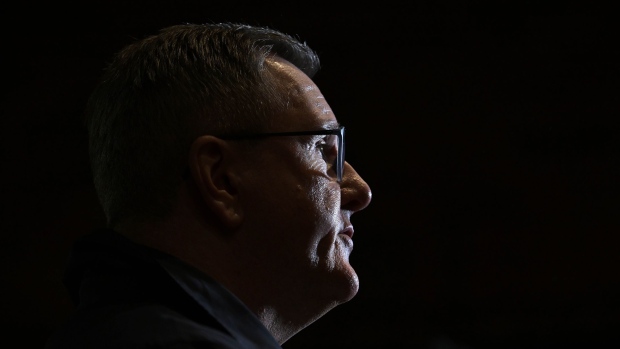Feb 5, 2022
Northern Ireland Government on Hold as Brexit Riles Tensions
, Bloomberg News

(Bloomberg) -- Northern Ireland’s Democratic Unionist Party cranked up the prospects of a prolonged political crisis following the resignation of the region’s First Minister, warning it won’t return to the power-sharing Executive unless issues related to Brexit are resolved.
“The DUP will not be involved in forming a government in Northern Ireland until those issues have been satisfactorily addressed,” the party’s leader Jeffrey Donaldson said Friday, referring to tensions over the Northern Irish Protocol, the part of the Brexit agreement which deals with trade to the region from the rest of the U.K.
Northern Ireland’s government was effectively paralyzed after the abrupt resignation of First Minister Paul Givan late Thursday forced the subsequent end of Sinn Fein’s Michelle O’Neill’s position as Deputy First Minister. The Executive can no longer meet or make decisions, basically freezing the legislative agenda.
“Some of the ministries will function but there will be no capacity to set budgets or to make any decisions beyond what was already agreed.” said Peter Shirlow, Director and Chair of the Institute of Irish Studies at the University of Liverpool.
Under the Good Friday agreement, the first minister and deputy first minister -- one unionist and one nationalist -- have equal powers and one cannot be in place without the other.
Northern Ireland Minister Quits, Adding Chaos to Brexit Dispute
Trade Dispute
The DUP’s condition seems unlikely to be met soon. While the EU and U.K. have struck a more positive tone since Liz Truss was promoted to Foreign Secretary, there’s been no substantive progress and the latest developments are set to cause more chaos. Truss and EU Vice President Maros Sefcovic are due to meet again on Feb. 11 to discuss their broader post-Brexit dispute.
Northern Ireland was effectively kept in the EU’s single market to avoid creating a hard border on the island of Ireland when the U.K. left the EU. Over time, the protocol has become a political sore: Britain has threatened to suspend it unilaterally unless it is changed; the EU has accused the U.K. of being reluctant to implement a binding deal; and the DUP has pushed for it to be scrapped entirely.
Why Northern Ireland Trade Poses a Brexit Conundrum: QuickTake
“The Protocol cannot be brought down unless the whole Withdrawal Agreement goes,” said Shirlow. What the DUP may have miscalculated is that some supporters have left them as they “simply want the Protocol to be mitigated and better outcomes gained,” he added.
One hope of reviving a functioning government is through an election, though even then both leading parties have to agree to take up the Executive posts.
“We won’t get a functioning Executive until there’s an election,” said Katy Hayward, professor of political sociology at Queen’s University Belfast in an interview. “We don’t know when it’s going to be, though Sinn Fein are calling for an early election, which makes it more likely.”
An election is scheduled to be held on or before May 5, though Sinn Fein have called for it to be held earlier following Givan’s resignation. Ultimately it’s up to U.K. Northern Ireland Secretary Brandon Lewis to decide.
Dysfunctional institutions
The events of this week and the dim prospects of restoring the Executive in the near future may have longer-term consequences for Northern Ireland’s political landscape.
“The majority of people want devolution to work, but they’re looking at the state of the institutions -- they’re dysfunctional,” said Hayward. “At the moment it’s possible for the DUP and Sinn Fein to have a have a veto if they use the nuclear option as Givan has done. It’s an unhappy state of affairs.”
Irish Prime Minister Micheal Martin on Friday expressed concern about the ability of a party to collapse the government.
“No one party should have a veto over whether the Executive exists or continues on, and likewise with the Assembly,” he told national broadcaster RTE, in response to Donaldson’s comments.
Businesses too are frustrated by the function of government effectively having been held hostage to the protocol.
“Business here is a big supporter of devolution,” Stephen Kelly, CEO of Manufacturing NI, explained. “The overall view here is that there’s been too much politics over the last 10 years and we’d like it to settle down so people can get on with business.”
©2022 Bloomberg L.P.








